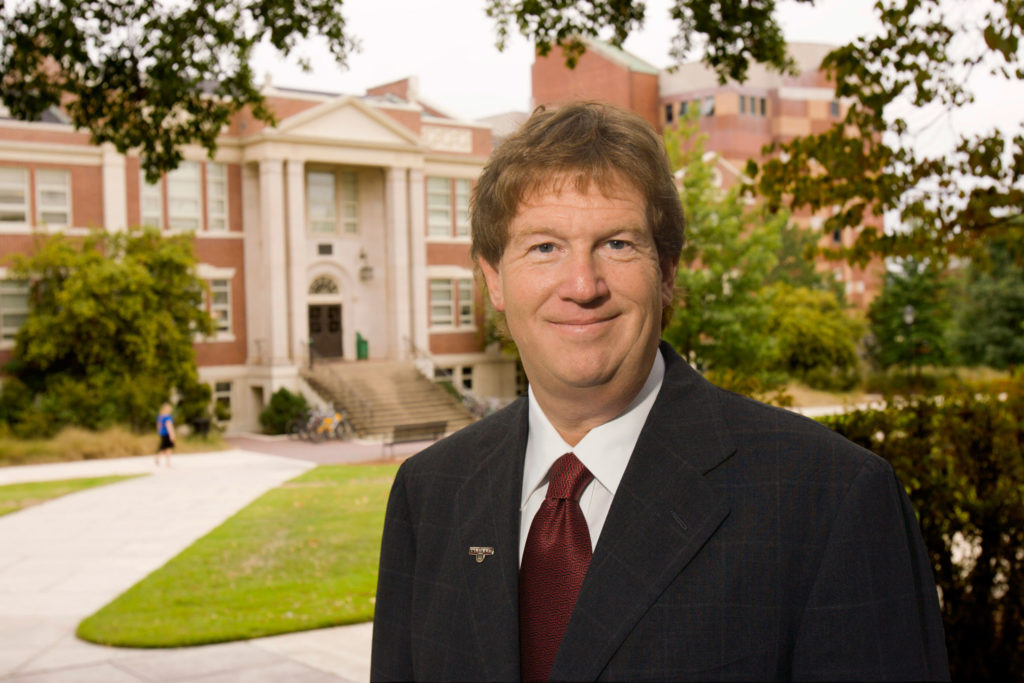Columns: What inspired you to choose forestry as a career?
Clutter: My dad, Jerry Clutter, was a forester and educator. I grew up around forestry and the forest products industry and that exposure appears to have rubbed off on me. The idea of managing natural resources, spending some time in the woods and applying sound business skills to this asset class interested me as a student . . . and still keeps my interest today.
Columns: What led you to decide to become a forestry professor?
Clutter: I was quite lucky to have grown up in a household where education played an important role. As I started my career in the 1980s, I was asked to develop some internal training programs for foresters. Through this process, I found that I enjoyed teaching—particularly topics that involved business management techniques applied to forestlands. This, coupled with an interest in applied research, bought me to UGA after 22 years in the private sector.
Columns: You have a joint appointment with the Terry College of Business. How, as a forester, did you become a member of the business college faculty?
Clutter: During my graduate programs here at UGA I had a mentor, Jim Fortson, who had a joint appointment at Terry and Warnell.
Dr. Fortson introduced me to forestland as an investment and the tools needed to evaluate the asset class. He encouraged me to include a number of graduate finance classes in my master’s and Ph.D. courses of study. Upon entering the private sector these skills were integral to most of the projects with which I was involved. The finance training I received here at UGA has contributed substantially to my success over the years. Upon my return to campus as a professor, I renewed those relationships with Terry and was lucky enough to be asked to teach some finance courses. It’s been a fun and productive relationship for me and my colleagues in the finance department. Additionally, I think students have benefited from my industrial experience and practical approach to corporate finance.
Columns: Why have you decided to move into administration?
Clutter: One concept that has always intrigued me is the creation of environments where individuals can be productive, contributing members of an organization. Some organizations appear to create this environment effectively while others appear to struggle.
I am excited about working with students, staff, faculty and stakeholders of Warnell to create that environment. To be involved in creating a place where people like coming to work and are excited about the opportunities presented is something I am interested in helping foster. As a member of the Warnell faculty and as the dean, I look forward to helping pursue that concept.
Columns: Since you were already a member of the Warnell School’s faculty, what do you see as its strengths? Areas of improvement?
Clutter: Warnell is a strong forestry and natural resources program with a great faculty and substantial resources at our disposal. Our primary challenge going forward is how to effectively maintain our traditional strengths while moving into emerging areas of natural resources management. If resources were unlimited this would be easy—but they’re not and we have to make some tough choices on resource allocation among our programs.
An area of improvement is to help identify opportunities for collaborative work among our disciplines within Warnell and among the other schools and colleges on campus. Interdisciplinary research has become an increasingly important component of success in our teaching, research and outreach programs, and it is something we will continue to emphasize and develop in the future at Warnell.
Columns; What are your goals and aspirations for your first year in leadership?
Clutter: We have a number of vacant positions that need to be filled. The individuals you choose to hire are, in my opinion, the most important decisions any organization faces. If done well it ensures a prosperous future—if done poorly, it creates many obstacles that must be overcome.
Columns: What role would you like for the Warnell School to play on campus? As a leader in managing the state’s forests and natural resources?
Clutter: Warnell has spent more than 100 years educating natural resources managers—it is the management part that separates our programs from others around campus and around the state of Georgia. We are committed to continuing that management focus as a core component of our program. Whether it involves forests, fish, wildlife, soil and water, or recreation, Warnell’s focus will continue to be management based.
We hope that our stakeholders around Georgia continue to use us as a primary source of information regarding the management of these important resources.
